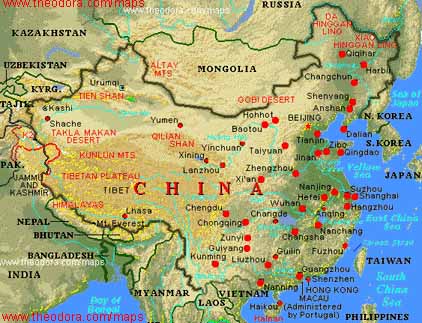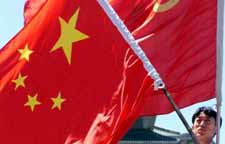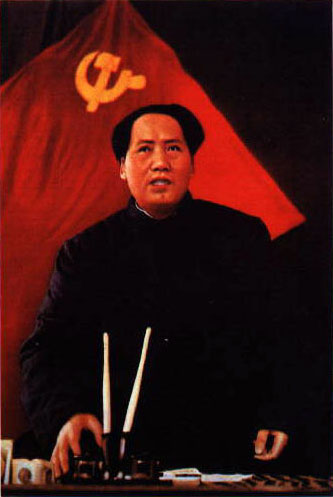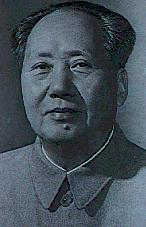 In
1956, China was going through political changes due to the fact that seven
years before was when China finally became a republic. Socialism was supposed
to be the transformation to make China a happy and peaceful nation. However,
this period showed how individuality influenced an entire nation.
In
1956, China was going through political changes due to the fact that seven
years before was when China finally became a republic. Socialism was supposed
to be the transformation to make China a happy and peaceful nation. However,
this period showed how individuality influenced an entire nation.
Mao Zedong, Chairman of the China's Communist Party (CCP), brought about the Hundred Flowers Campaign in May of 1956. He needed the support of the intelligentsia in order to forward China's socialistic society, which was that of taking on the Soviet socialist system full of science, technology and agriculture. His movement gave freedom of speech to the Chinese, a privilege that they never truly had before without persecution or fear. However, the harsh criticisms from the intelligentsia and students about China's political regime, the Communist Party, put an end to that freedom.
Intellectuals were a vital role in advancing the power of New China. There were key points that explained how the Hundred Flowers Campaign came about, what happened during that time period, and what occurred because of it. Nikita Khrushchev, the Soviet leader, shockingly came forward with a speech which was about how treacherous and murderous Joseph Stalin (previous Soviet leader) was, which was directly opposite of the revolutionary and camaraderie that the Chinese people were led to believe he was. This is most devastating in that China was trying to adopt the Soviet social system. Mao announced his Hundred Flowers Campaign in order to appeal to the intelligentsia, whom he needed in order to advance China in the areas of science and agriculture. The campaign evoked brutal criticism that stated that the Chinese had freedom of speech, the intellectuals thought that they did not have to worry about any Chinese official jailing or killing them for what they said. Yet, because of the extreme intense feelings that were expressed by millions of Chinese, Mao ended the campaign and suppressed freedom of speech. The Hundred Flowers Campaign defined an era in Chinese history unlike any other. The strength of the Chinese government was built upon having a powerful and influential image, which came from its partnership with Russia, however, when Khrushchev defied it, he became known as a traitor to communism, so Khrushchev, along with the intelligentsia threatened the Chinese government. The One Hundred Flowers Campaign was full of angst against what intellectuals and students felt about the communist system, but who could have known the degree of what would happen within the Chinese government.
The One Hundred Flowers Campaign, led by Mao, was his fight to make
China more powerful, and he needed the intelligentsia to help advance China.
He believed that giving the intelligentsia the freedom to voice their opinions
would make them more loyal to the communist cause.
 After
Mao established his communist regime in China, a new constitution written
in 1954 contained freedoms of speech, assembly and press (158 Meisner).
However, these freedoms were only issued when it was in favor of socialism.
Intellectuals received the most ridicule, and their ideology continuously
changed. In 1949, the Communists had won the support of much of the intelligentsia,
but that support was slipping. So, the party was now in the motion of regaining
that support due to economic reasons. Science and technology were needed
to bring China prosperity and power, therefore, the intelligentsia needed
to be more advanced and more progressive. China had a twelve-year plan
for the development of science, and included in that was that they needed
the intelligentsia to cooperate. However, the intelligentsia were
fearful of the Communists because the intelligentsia were being oppressed.
Mao had called for a twelve-year program for improving agricultural production,
but he needed the intelligentsia to help through their participation in
the economic and political life of China.
After
Mao established his communist regime in China, a new constitution written
in 1954 contained freedoms of speech, assembly and press (158 Meisner).
However, these freedoms were only issued when it was in favor of socialism.
Intellectuals received the most ridicule, and their ideology continuously
changed. In 1949, the Communists had won the support of much of the intelligentsia,
but that support was slipping. So, the party was now in the motion of regaining
that support due to economic reasons. Science and technology were needed
to bring China prosperity and power, therefore, the intelligentsia needed
to be more advanced and more progressive. China had a twelve-year plan
for the development of science, and included in that was that they needed
the intelligentsia to cooperate. However, the intelligentsia were
fearful of the Communists because the intelligentsia were being oppressed.
Mao had called for a twelve-year program for improving agricultural production,
but he needed the intelligentsia to help through their participation in
the economic and political life of China.
 On
May 2, 1956, Mao's movement of "let a hundred flowers bloom" and "let a
hundred schools of thought contend" took into effect (273 Howard). The
first quote was aimed at artists and writers, whom he encouraged to freely
express themselves within the realms of social realism. The latter quote
was for the scientists (intelligentsia), whom he wanted to not fear the
government when advocating different scientific theories for the purpose
of scientific progress.
On
May 2, 1956, Mao's movement of "let a hundred flowers bloom" and "let a
hundred schools of thought contend" took into effect (273 Howard). The
first quote was aimed at artists and writers, whom he encouraged to freely
express themselves within the realms of social realism. The latter quote
was for the scientists (intelligentsia), whom he wanted to not fear the
government when advocating different scientific theories for the purpose
of scientific progress.
